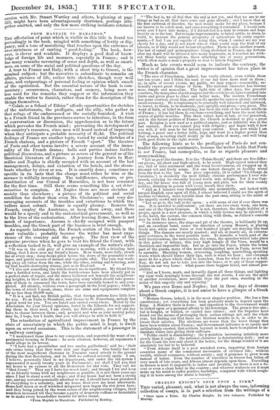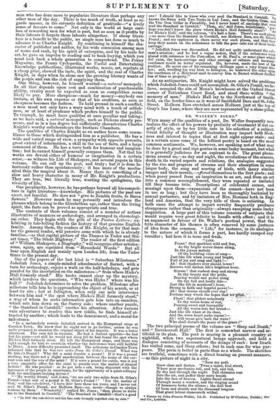CHARLES KNIGHT'S ONCE UPON A TIME.*
THIS varied, pleasant, and, what is not always the case, informing collection of essays, is in part a selection from the writings of a • Once upon a Time. By Charles Knight. In two volumes. Published by Murray. man who has done more to popularize literature than perhaps any other man of the day. There is too much of truth, at least as re- gards masses, in the sarcastic definition of gratitude—" a lively sense of favours to come." Not only is the world at large care- less of rewarding men for what is past, but as soon as it profits by their labours it forgets those labours altogether. If cheap litera- ture is a benefit to the public, no single man has done so mucbto advance it as Charles Knight. By combining in himself .the cha- racter of publisher and author, by his wide connexion among men of name and rank, by his spirit of enterprise, and by his taste for art, he gave an impulse to reading and to book-buying, which you must look back a whole generation to comprehend. The Penny Magazine, the Penny Cycloptedia, the Useful and Entertaining Knowledge publications, illustrated works, music, art, reprints at a cheap price, showed the taste, the spirit, and the zeal of Charles Knight, in days whien,he alone saw the growing literary wants of the people and ran the risk of supplying them. One thing, however, he himself wanted—a natural monopoly. In all that depends upon cost and combination of purchaseable ability, rivalry must be expected as soon as competition seems likely to pay. Mere cheapness—much for money—anybody can imitate, at his own expense or that of his creditors, as soon as cheapness becomes the fashion. To hold ground in such a conflict, a man must not only have a wary mind with a touch of selfish- ness, or at least of prudence which prefers himself to the public. To triumph, he must have qualities at once peculiar and taking; as we have said, a natural monopoly, such as Dickens clearly pos- sesses, and as in a less degree but sufficiently characterizes Charles Knight's worthy collaborateurs the brothers Chambers. The qualities of Charles Knight as an author have some resem- blance to those which distinguished him as a publisher. He has a wide and varied range of view, a sympathy with opposite pursuits, great extent of information, a skill in the use of faets, and a large command of them. He has a taste both for humour and imagina- tion ; but he cannot himself generally compass them. Not that his works are devoid either of humour or imagination in a certain sense,—as witness his Life of Shakspere, and several papers in this volume. He can call up the past, and truly; but it is done la- boriously rather than spontaneously ; it has more of the mecha- nical than the magical about it. Hence there is something of a slow and heavy character in many of Mr. Knight's productions. They are true, but literally true, wanting the springiness, the vivacity of life.
One peculiarity, however, he has perhaps beyond all his competi- tors in light literature—knowledge. His pictures of the past are exact, not fanciful. He does not "give to Zembla fruits, to Berea flowers." However much he may personify and introduce the phrases which belong to the Elizabethan age, rather than the living spirit, the facts can be proved as appropriate and true.
The contents of these volumes consist of a number of notices illustrative of manners or archreology, and arranged in chronologi- cal order. They begin with the pith of the Poston Letters ; ex- hibiting in tale-telling fashion the history of that genuine English family. Among them, the readers of Mr. Knight, or for that mat- ter the general reader, will perceive some with which he is already familiar,—as that capital picture of the Thames in Tudor and Stu- art times, "The Silent Highway." The reader of the first edition of " William Shakspere, a Biography," will recognize other articles : some, again, are reprinted from " Household Words." But all bear upon English and mainly upon London life, from the Tudor times to the present day.
One of the papers of the last kind is " Suburban Milestones." Jedediah Jones, a simple-minded schoolmaster of Barnet, with a turn for archaeology, enjoys a walk on the half-holydays, and gets puzzled by the inscription on the milestones—" from where Hicks's Hall formerly stood." His books cannot clear up the mystery, which involves the questions, " Who was Hicks ? where was his hall ?" Jedediah determines to solve the problem. Milestone after milestone tells him he is approaching the object of his search, or at least its site ; but at Islington, when only one mile intervenes between him and " the spot where Hicks's Hall formerly stood," a wag of whom he seeks information gets him into an omnibus, which sets him down on the Surrey side ; where another puzzle, " the Standard in Cornhill," excites his attention. After various vain adventures to resolve this new riddle, he finds himself at- tracted by another; which leads to the denouement, and a moral for milestones.
"In a melancholy reverie Jedediah arrived in the Hampstead stage at Camden Town. He knew that be ought not to go further, unless he was quite prepared to abandon the original object of his inquiry. It was a bitter afternoon. The rain fell in torrents. He had a furious appetite—he had lost his purse—yet still he would not sleep till he had found the spot where Hicks's Hall formerly stood. He left the Hampstead stage, and there was light enough for him to ascertain whether the milestones were still faithful to Hicks. A new difficulty presented itself. The milestone in Camden Town informed him that he was two miles from St. Gilds Pound. What was St. Giles's Pound ? Why did a saint require a pound ? If it was a pound sterling, was there not a slight anachronism between the name of the cur- rent coin and the sera of the saint ? If it were a pound for cattle, was it not a very unsaintly office for the saint to preside over the matter of strayed heifers ? He was puzzled : so he got into a cab, being disgusted with the ignorance of the people in omnibuses, for the opportunity of a quiet colloquy with the intelligent-looking driver.l. " My worthy friend,' said Jones, we are only two miles from St. Giles's Pound—what sort of a pound is St. Giles's Pound ? "For the matter of that,' said the cab-driver, 'I have driv here these ten years, and I never yet seed St. Giles's Pound, nor Holborn Bars—no, never—though ve always reckons by them.' Wonderful !' replied Mr. Jones • 'then please to drive me to the Standard in Cornhill.' 'The Standard in ■Carishill—that's a good + " In 1837 the cab-driver and his fare rode lovingly togethei side by side." one ! I should like to know who ever seed the Standard in Cornhill. Ve knows the Swan with Two Necks in Lad Lane, and the Golden Cross, and the Vile Orse Cellar in Piccadilly-, butt never heard of anybody that ever seed the Standard in CornhilL" Then, sir,' said Jones, breathlessly, I, per. haps you don't know the place where Ricks's Hall formerly stood ? ' ,A8 for Hicks's Hall,' said the cabman, it's hall a hum. There's no such place, —no more than the Standard in Cornhill, nor Holborn Bars, nor St. Giles's Pound ; and my oppinnun is, there never wor such places, and that they keep their names on the milestones to bilk the poor cabs out of their back- carriage.' "Jedediah Janes was discomfited. He did not quite understand the cab- man's solution; and he had a vague notion, that if the milestones were placed with reference to the Post-office, or St. Paul's, or some place which did exist, the back-carriage and other carriage of cabmen and hackney. coachmen would be better regulated. He, however, made the best of his position. He spent one of his remaining shillings upon a very frugal din- ner; and, wending his way back to Islington, he bestowed the other upon the coachman of a Holyhead mail to convey inm to Barnet without further loss of time or property.'
As an antiquarian, Mr. Knight might have solved the problems which Jedediah Jones could not accomplish. St. Glles's Pound, we be- lieve, occupied the site of Meux's brewhouse at the Oxford Street corner of Tottenham Court Road, and stood there within " the memory of man." Hicks's Hall lay to the Northward of Smith- field, on the border-lines as it were of Smithfield Bari and St. Mei Street. Holborn Bars stretched across Holborn just at the top of Gray's Inn Lane, where they are now represented by a stone pillar.



































 Previous page
Previous page